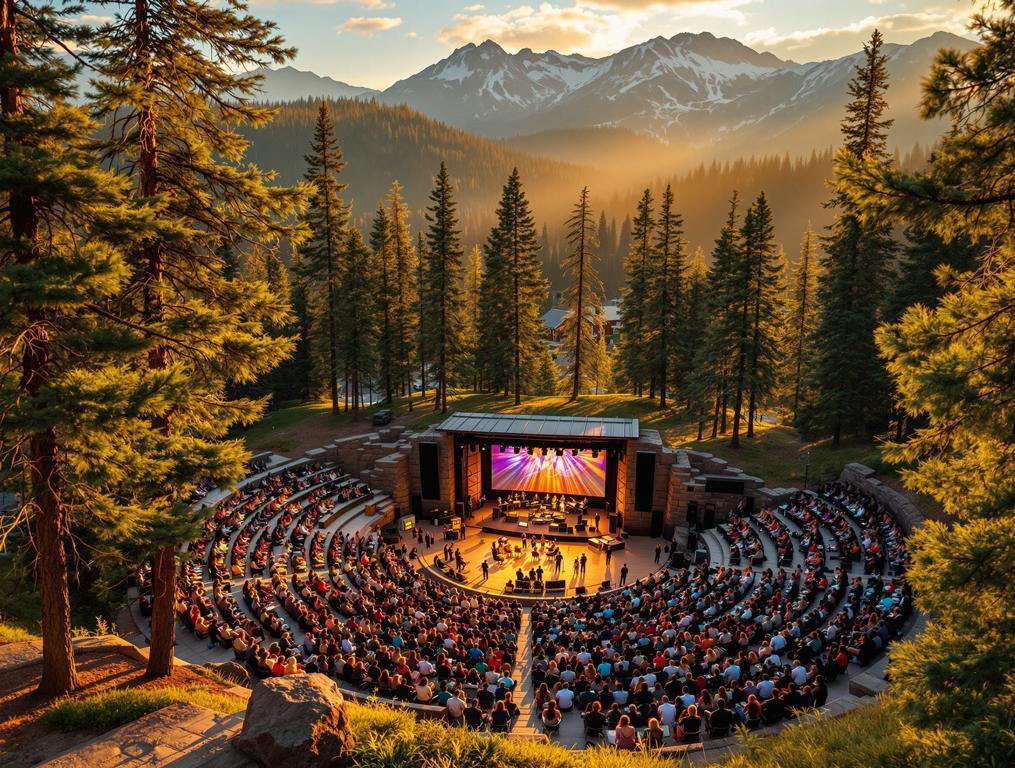I step from my rental car into the golden afternoon light of Ashland, Oregon, a town that defies mathematical probability. With just 20,600 residents, this pocket-sized mountain hamlet somehow hosts 400,000 theater enthusiasts annually. That’s 19 visitors for every local. The air buzzes with anticipation as I join the crowd streaming toward the Oregon Shakespeare Festival’s historic Bowmer Theatre, just 370 miles north of Los Angeles but worlds away from Hollywood’s commercial glitz.
A program in my hand advertises OSF’s 90th anniversary season, running through October 2025. Glancing around at the mix of sandal-wearing hikers fresh from Lithia Park’s trails and dressed-up theater-goers, I realize I’ve stumbled into something rare in American cultural life: a perfect fusion of world-class art and pristine nature.
The 19:1 Phenomenon: America’s Most Unlikely Cultural Powerhouse
Ashland’s visitor-to-resident ratio is staggering. At 19:1, it outpaces even established tourism hubs like Branson, Missouri. What makes this number even more remarkable is that these visitors aren’t coming for beaches or theme parks.
They’re coming for Shakespeare. And Chekhov. And contemporary playwrights whose works grace three distinct theaters in this small mountain town.
“Some towns have sports teams or natural wonders. We have Hamlet soliloquies and Macbeth’s witches,” a barista tells me as she crafts my morning coffee before I head to a matinee performance.
The Oregon Shakespeare Festival, founded in 1935, has transformed this former lumber town into what many consider America’s most unlikely cultural hotspot. Summer 2025 marks its 90th anniversary season, creating a once-in-a-generation alignment of theatrical excellence and perfect outdoor conditions.
America’s Stratford-upon-Avon: Where Theater Meets Nature
Walking from my morning performance to Lithia Park’s 10 acres of Japanese gardens and wildflower meadows, I understand why Ashland is often called America’s Stratford-upon-Avon. Like Shakespeare’s English birthplace, this town has built its identity around theatrical tradition.
But unlike its British counterpart, Ashland offers the distinctly American bonus of wilderness at its doorstep. The surrounding mountains provide a dramatic backdrop for cultural immersion.
“I came for the plays but found myself equally moved by the sunsets over the Siskiyou Mountains. Where else can you watch King Lear in the afternoon and stargaze in mountain meadows by night?”
This visitor’s sentiment captures Ashland’s unique appeal. The town sits at 1,900 feet elevation, creating perfect summer temperatures for outdoor exploration. I watch families picnicking by Ashland Creek while others browse the Lithia Artisans Market, open weekends through October.
Like other small towns balancing tourism with authenticity, Ashland has managed to preserve its character despite welcoming visitors numbering 20 times its population. Its historic downtown showcases beautifully preserved Craftsman and Victorian architecture, including the Oregon Cabaret Theatre, ingeniously housed in a converted church.
Summer 2025: The Perfect Storm of Culture and Nature
This summer offers unique advantages for visitors. The Green Show – free outdoor performances Wednesday through Saturday at 6:45 PM – showcases everything from acrobatics to music in the festival courtyard.
Beyond theater, June and July bring peak wildflower blooms to Lithia Park’s Japanese Garden and meadows. The park’s bridges and creekside paths offer cool respite from summer heat.
For optimal experiences, arrive Tuesday through Thursday when crowds thin slightly. Matinee tickets are easier to secure, and you’ll find breathing room at local gems like Chozu Bath & Tea Gardens, where Japanese-inspired soaking tubs provide post-theater relaxation.
After three days immersed in Ashland’s cultural-natural fusion, I understand why this town punches so dramatically above its weight. Like a perfect theatrical production, it combines seemingly disparate elements – wilderness and sophistication, intimate scale and world-class ambition – into something greater than its parts.
As I pack my car to head back to Portland, program books and hiking maps mingling in my backpack, I can’t help but feel I’ve experienced a distinctly American cultural phenomenon: a tiny mountain town that, through sheer creative force and natural beauty, has earned its place on the world stage. Emma will love the pressed wildflowers I’m bringing home – and next summer, I’ll bring the whole family to experience this theatrical wonderland for themselves.
